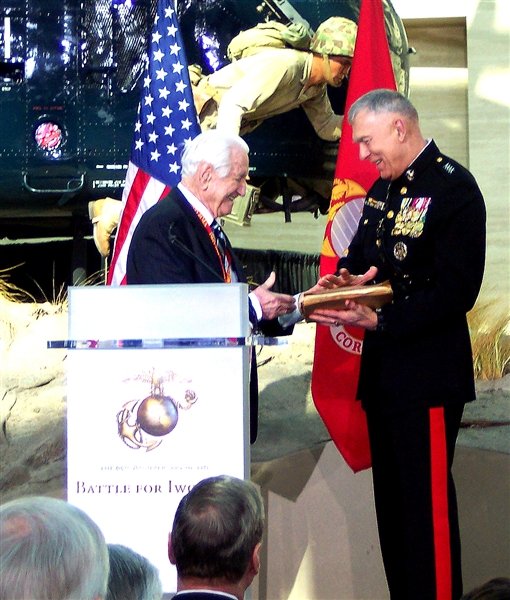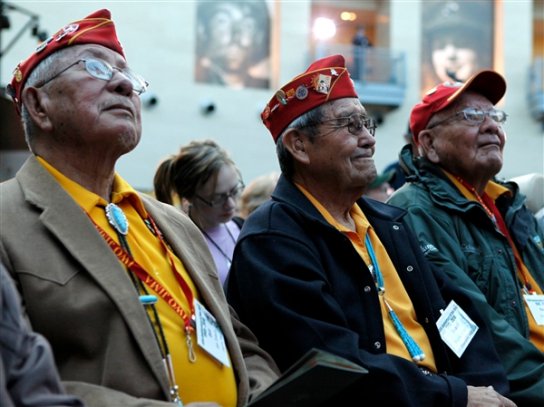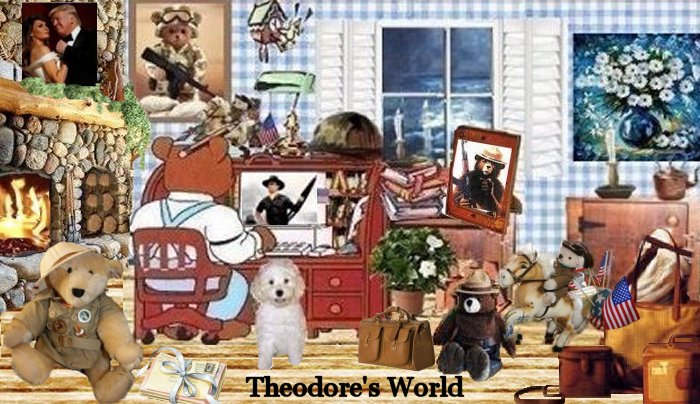« Obama and Democrats Vow To Rahm Through Socialized Medicine | Main | Ann Coulter At CPAC »
February 20, 2010
Iwo Jima Vets Observe Battle's 65th Anniversary

Retired Marine Corps Lt. Gen. Larry Snowden presents Gen. James T. Conway, commandant of the Marine Corps, with a war document he carried home from the Battle of Iwo Jima at the National Museum of the Marine Corps, Triangle, Va., Feb. 19, 2010. The men spoke at a 65th anniversary commemoration of the battle.
.
.
Veterans and military leaders gathered February 19 at the National Museum of the Marine Corps to remember the 65th anniversary of the Battle of Iwo Jima.
Iwo Jima Vets Observe Battle's 65th Anniversary
TRIANGLE, Va.,
Feb. 19, 2010
Dozens of veterans of the Battle of Iwo Jima and their families gathered at the National Museum of the Marine Corps here today to commemorate the 65th anniversary of the iconic World War II battle.
The battle for Iwo Jima – the first U.S. attack on Japanese soil – is memorialized worldwide by the famous Joe Rosenthal photo of five Marines and a Navy corpsman raising the U.S. flag on Mount Suribachi. Three of the six later were killed in battle.
“Iwo Jima was not the bloodiest or the longest battle” of World War II and “it probably was not even the most successful in the Pacific Island campaign,” Gen. James T. Conway, commandant of the Marine Corps, told the audience. “All that said, Iwo Jima occupies a place in our history like no other battle.”
Conway said he believes that’s a result of the determination, courage and sacrifice of the men who fought there, noting the “savagery” of the battle. “It was kill or be killed,” he said.
And that was true of both sides of the fighting, Conway said, noting a comment a Japanese lieutenant colonel made about the Americans during the battle: “They are relentless, and they fight with a mentality like they are exterminating insects.”
George Alden of Fort Worth, Texas, was a 20-year-old sergeant with 1st Battalion, 27th Marine Regiment, 5th Marine Division, when he stormed the volcanic ash beach in the first wave of U.S. troops onto Iwo Jima. The Japanese -- who with 21,000 troops had nearly three times more men than Alden and his unit expected -- had terraced the beach, making for an arduous climb for the troops who had no alternative but to move forward on the eight-square-mile island.
About 400 yards up the beach, Alden and his unit came upon a bunker. After taking charge of the action that demolished the bunker, Alden was seriously wounded on his left side by rifle fire. “I laid out in the open until almost dark,” he recalled.
Finally, a litter bearer approached the injured Alden. “They said they’d passed me four times thinking I was dead,” he said. They could not evacuate him until the next morning, leaving Alden and three of his comrades in a fox hole overnight.
Three days later, on the fifth day of the battle, Alden was aboard a hospital ship when a medic told him to look out the port hole over his bed. “That was when I saw the flag rising up above the smoke and haze,” he said, remembering the scene of Rosenthal’s famous photo.
Like others, Alden said, the image of the U.S. flag on the mountaintop made him think the battle soon would be over. In fact, it would last 31 more days, claiming 6,820 Americans dead or missing, and 19,000 wounded.
“We could not have guessed that Feb. 19, 1945, would start 36 of the most deadly days in the history of the Marine Corps and probably the most savage fighting we have ever engaged in,” Conway said.
For today’s Marines, Iwo Jima is the “gold standard,” the commandant said. “It drives us, it inspires us, and it gives us confidence” in training and preparedness, he said.
In the Iraq war, Conway said, a young Marine was asked about the possibility of U.S. troops wresting control of Fallujah from insurgents. “Of course we can take Fallujah,” Conway said the Marine replied. “We took Iwo Jima.”
Retired Marine Corps Gen. James L. Jones, now President Barack Obama’s national security advisor, thanked the veterans for their service. “We honor your legacy for the lives you saved,” he said.
Jones said today’s Marines gain strength from the examples set by the veterans of Iwo Jima, and he asked the audience to keep today’s Marines in mind, especially those confronting the Taliban in Afghanistan.
Ron “Rondo” Scharfe, an Iwo Jima veteran from Missoula, Mont., was 16 when he hit the Japanese island’s shores. “Our knees were shaking so bad we could barely stand up,” he said. “We didn’t know where the hell we were going. We were tight as rubber bands.”
Scharfe said he and his comrades crawled onto the beach, which already was smoking and “smelling like a junkyard” on the first day of battle. The Japanese “waited ‘til we got on the beach, then they opened up on us,” he said.
Scharfe survived nine days of Iwo Jima without serious injuries, before being sent to Okinawa. Today, he said, he thinks about the Marines in Afghanistan and thinks Iwo Jima was easier in at least one way. “At least we knew who the enemy was,” he said.
Retired Marine Corps Col. Harvey Barnum, a Medal of Honor recipient for heroism in Vietnam, said the courage of those on Iwo Jima was proven by the number of Medal of Honor recipients the battle yielded: 22 Marines and five sailors.
The commemoration of the battle is important for the veterans who remain, Barnum said.
“They’ve gotten older, but nothing has changed in their heart,” he said. “These people are all in their 80s, and they’ve come from all over the country to be here. But this will be the last time for many of them.”

Bill Toledo, Frank G. Willetto and Keith Little, Navajo code talkers, participate with other Iwo Jima veterans at a ceremony commemorating the 65th anniversary of the Battle of Iwo Jima at the National Museum of the Marine Corps in Triangle, Va., Feb. 19, 2010. On Feb. 19, 1945, the United States launched its first assault against the Japanese at Iwo Jima, resulting in some of the fiercest fighting of World War II.
.
1945: US flag raised over Iwo Jima 2/23/1945
US troops have raised the Stars and Stripes over Iwo Jima four days after landing on the Japanese-held volcanic island.
The 28th Regiment of the 5th Marine Division took Mount Suribachi at 1030 local time.
The extinct volcano offers a strategic vantage point for the ongoing battle for control of the island.
Lying in the north-west Pacific Ocean 650 miles (1,045 kms) from Tokyo, Iwo Jima would serve as a useful base for long-range fighters to cover B-29 Superfortresses in a bombing campaign against the Japan’s capital.
Although the Stars and Stripes are flying over the island the battle is far from over and the Japanese are reported to be defending every inch of the island using elaborate underground defences.
The battle for Iwo Jima has been described as the toughest fight in US Marine history by the commander of the Marines in the Pacific, Lt-General M “Howling Mad” Smith.
On 19 February, after four days of naval and air bombardment had pounded the beaches and weakened Japanese defences, the 4th and 5th Marine Divisions landed on the south side of the island under the overall command of Vice-Admiral Richmond Kelly Turner.
After a day of little resistance, the enemy fought back in earnest.
Hidden in fortified caves and pillboxes linked by a series of tunnels they relentlessly attacked the Americans with artillery fire, grenades and other explosives as well as from the air.
The last 24 hours have seen the fiercest fighting yet with every step of the way up the mountain defended by the Japanese.
But by 1035 local time the Marines had reached the summit of Mt Suribachi.
Reporting from the US base in Guam, Admiral Chester W Nimitz said so far the battle had cost 5,372 casualties, including 644 dead, and that US carrier-based aircraft flying over the Bonin Islands north of Iwo Jima had destroyed three enemy planes.
Reuters news agency also reports Marines have finally reached the Japanese fighter-plane base in the centre of the island, which lies just 700 yards (640m) from the bomber airfield taken by the Americans two days ago.
In Context
The Japanese army and naval troops under Lt-General Kuribayashi Tadamichi fought to the death but the US Marines finally secured the whole island on 26 March in one of the bloodiest battles of the war.
Out of the 74,000 Marines that landed more than a third were killed or wounded.
The US then used the island to launch bombing raids on Japan.
The photograph of the US Marines raising the flag over Mount Suribachi was taken by Associated Press photographer Joe Rosenthal and is one of the most famous images of the war. It won the Pulitzer Prize in 1945.
A memorial based on the photo stands at Arlington Cemetery, Virginia.
Iwo Jima was returned to Japan in 1968.
.

Wild Thing's comment.......
Ron “Rondo” Scharfe, an Iwo Jima veteran from Missoula, Mont., was 16 when he hit the Japanese island’s shores. “Our knees were shaking so bad we could barely stand up,” he said. “We didn’t know where the hell we were going. We were tight as rubber bands.”
Wow 16 years old.
These true Americans heroes are leaving us so fast. I love to listen to them speaking about their past.
One Uncle was in the battle on Iwo Jima and all the other Islands, two uncles made D-day one to the beaches, the other dropped in with 101st Airborne. They have all passed away, but when they would talk about the war I woud sit with them and listen.
Posted by Wild Thing at February 20, 2010 06:55 AM
Comments
During the 2-month-long battle, 27 U.S. military personnel were awarded the Medal of Honor for their actions. Of the 27 medals awarded, 23 were presented to Marines and four were presented to United States Navy sailors; this is a full 30% of the 82 Medals of Honor awarded to Marines in the entirety of World War II.[1]-Wikipedia.
Two of these went to Corpsmen assisting wounded Marines. I can't locate the other two.
Interestingly though, NOT one American won the Medal of Honor. According to Wikipedia, these medals were awarded to: African-American, Asian-American, Hispanic, Italian-American, Jewish-American, Native-American and Puerto-Rican. This diversity shit is an insult to everyone who served. In any foreign country I've ever been to, when asked, Who are you or where are you from, every single Marine and Sailor I've known always answered that question with, 'I am an American." I don't remember any hyphenated Americans.
The 3rd, 4th and 5th Marine divisions was the American force on Iwo Jima. the 3rd was supposed to be held in reserve but the casualties were so great that lasted about 3 days.
After the Airfield was secured, some re-enforcements arrived and their job was to guard the Airfield. One day there was a private on guard duty, when observed, he was swatting at something, making quite a spectacle of himself. Some Lieutenant yelled at him, 'Private what are you doing' , the Sentry replied, 'swatting Bees sir', the Lieutenant yelled back, 'those aren't Bees, Private, those are bullets.'
This is supposed to be a true story, according to "Sgt. Grit" in one of his news letters.
We’re not accustomed to occupying defensive positions. It’s destructive to morale.
—LtGen H. M. “Howlin’ Mad” Smith, Iwo Jima, 1945, quoted to Walter Karig
Posted by: Mark at February 20, 2010 09:08 AM
Gives me goose bumps just reading it. Wow, wow, wow!!! God bless our troops and give them a swift victory wherever they are fighting today.
Ed
Posted by: Eddy at February 20, 2010 09:41 AM
"Tight as rubber bands" That quote say's a lot :)
Thursday I dropped in to visit a Vietnam vet in the next county who happened to be out of his office at the time but while there I spent at least an hour with a retired Navy Hospital Corpsman who served with the U.S. Marine Corps during WWII, he'd went in in '43, was wounded somewhere in the S. Pacific, went back again in Korea and again for two tours in Vietnam all as a Corpsman with the Marines, "Doc" told me he became a corpsman because he couldn't get along as a sailor onboard ship, he was transferred, retrained as a corpsman then sent into the thick of it. Not many like that left, God bless 'em.
Semper Fi Marines
Posted by: Jack at February 20, 2010 11:11 AM
Great history. I would hope that the sailors aboard ship were all rotated from the engine room, gallies etc. to go topside and see the flag. My youngest, the sailor, told me how it all works. First Naval air pounds the target. Second, the Marines go in and kill anyone leftover. Third, the Army moves in and hooks up the coffee pot. Lastly, the Air Force shows up and flies around overhead.
Jack, a belated Happy Birthday. Mine was yesterday also. I hope your cake was better than mine. About a 5-day old piece of chocolate cake on the Slope. Kinda chewy.
Posted by: Jim at February 20, 2010 12:19 PM
"I love the smell of zippo flame throwers in the air... smells like.... VICTORY!" GOD bless the GREATEST GENERATION Wild Thing...
Posted by: darthcrUSAderworldtour07 at February 20, 2010 02:28 PM
WOW! just ...WOW!
Posted by: jan at February 20, 2010 03:03 PM
Thank you everyone so much. Thank you too for the added informtion.
Posted by: Wild Thing at February 20, 2010 07:33 PM
Thank you Jim, likewise a belated Happy Birthday, yikes, yes I did it in style, my glucometer pegged this morning!!! Thanks for hanging in there on the Slope.
Lost a fellow co-worker from the slope Thursday, B. Meridith, was ill for some time the big C got him.
Posted by: Jack at February 20, 2010 08:35 PM
Jim Happy Birthday, thank you so much for being here and a part of Team Theodore.
Posted by: Wild Thing at February 20, 2010 11:49 PM
